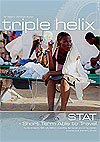At the time of writing, the United States government and legislature are in the midst of a huge wrangle about how far and how deep they will cut expenditure over the next two years. 1 This situation is familiar to us in the UK as we stare at fiscal austerity measures that see many essential services facing severe cuts in a drive to reduce the budget deficit. An interesting difference between the US and the UK is that spending on overseas aid has been largely protected here in Britain, but across The Pond it is likely there will be massive cuts to overseas aid. (2)
Whatever the eventual outcome, US spending on the world's poor will probably decrease. And while US overseas aid makes up less than 0.2% of their gross national income, the size of the US economy still makes them the largest national aid donor in the world.
This could have a significant impact on Christian organisations, which tend to be funded more favourably by the US than by other donors, and inevitably services to those most in need will suffer. This is particularly so as, where the US leads, other donors tend to follow. Christians have a responsibility towards the poor, whether on our own doorstep or further afield, and it is certainly true that in Africa and South Asia alone, Christian hospitals, clinics and churches provide a disproportionate amount of healthcare to the poorest communities. Sadly, this happens with relatively little support from Christians in the West.
At the Lausanne Conference on World Mission in Cape Town last October, Richard Stearns, author of The Hole in Our Gospel, 3 challenged the church, particularly in the rich nations, about engaging with global justice issues. (4) If we reoriented our lives in giving – our time, our money, our skills – to serve the poor in the name of Christ, and gave it not to expensive buildings and comfortable lifestyles, but in a radical commitment to justice, the church could have a significant impact on global inequalities and injustices. This would happen whether or not our governments get engaged.
And with that commitment to the poor, we gain a prophetic voice that challenges the political will of governments to act justly. (5) The Apostles remind us that faith leads to action, and a care for those in need is integral to the outworking of our faith. (6)































